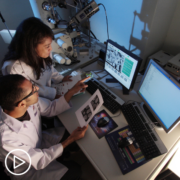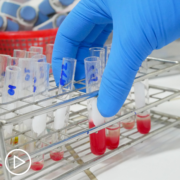Myeloma Research | CAR T-Cell Therapy Clinical Trials
Myeloma Research | CAR T-Cell Therapy Clinical Trials from Patient Empowerment Network on Vimeo.
What new CAR T-cell therapies are being studied in clinical trials? Dr. Adriana Rossi shares an overview of alternatives to CAR T-cell therapy, information about the latest CAR T clinical trials, and advice for patients that may be interested in participating in a trial.
Dr. Adriana Rossi is co-director of the CAR T and stem cell transplant program at the Center for Excellence for Multiple Myeloma at Mount Sinai Health System in New York City. Learn more about Dr. Rossi.
See More From Thrive CAR T-Cell Therapy
Related Resources:

Understanding CAR T-Cell Therapy | How It Works and Who It’s Right For |

|

|
Transcript:
Katherine Banwell:
What are the alternatives if a patient decides CAR T is not right for them?
Dr. Adriana Rossi:
I would say as part of this newest revolution and fairly comparable in novelty and method of action would be the bispecific antibodies. So, these are molecules.
They are not cells. And they activate the patient’s own T cells and bring the T cells to the myeloma, causing very similar side effect profile and very similar effectiveness. The rates are a little bit lower but they are administered as mostly a subcutaneous injection that has to be dosed weekly or every other week. The contrast is it’s a continuous therapy, but it does allow us to adjust as we go, which the cellular therapy doesn’t.
Katherine Banwell:
While there are approved CAR T-cell therapies for myeloma currently, there are also many others that are in clinical trials. Would you talk about some of the ongoing research in this area?
Dr. Adriana Rossi:
Absolutely. Again, while we celebrate the tremendous changes that these two CAR Ts have made to the field, they are both autologous, meaning we use the patient’s own T cells for manufacturing. They both target BCMA.
And they are both what we call second generation T cells. So, other areas are to change the target. So, instead of just targeting BCMA, there are studies specifically targeting GPRC5D, which are coming down fairly soon. Rather than using the patient’s own T cells there are a number of products that use a healthy donor’s T cells, which are available immediately.
So, we don’t need to go through the bridging therapy, and we don’t have to wait for the cells to be ready. And lastly, there are different manufacturing processes. As I mentioned, the ones we currently have may take up to eight weeks for manufacturing. There are some studies now where cells are basically manufactured, engineered, in 48 hours –
Katherine Banwell:
Oh, wow.
Dr. Adriana Rossi:
– and are ready to be infused so that they actually grow in the patient rather than in a Petri dish. So, lots of areas of exploration and I look forward to, in five years, being able to look back and see again how the field has changed.
Katherine Banwell:
And I’m sure it will, by the sounds of it. Are there any trials introducing CAR T-cell therapy as an earlier line of myeloma treatment?
Dr. Adriana Rossi:
There are. So, both the products that are now commercially available for the fourth line are being studied in earlier and earlier lines. We actually just this year got results of the CARTITUDE-4 study, which was in one to three prior lines, and expect that that will lead to an earlier approval in the very near future.
And we have a number of studies, again, with both products looking at patients who have either high risk disease or don’t respond as well as we would like to their frontline therapy, and actually being used as part of that first line.
Katherine Banwell:
Dr. Rossi, what advice do you have for patients who may be hesitant to participate in a clinical trial?
Dr. Adriana Rossi:
Education. More than anything, understand what they are. Clinical trials come in all shapes and sizes. We have these exciting molecules that have to go into a first human at some point but we also have tried and true therapies that we know – for example, the CAR T – that is approved in these later lines. That same product is being now offered earlier. So, that has to be within a clinical trial because it’s not the approved indication.
But it is a product that we know to be safe. We know that it works in advanced disease and are actually expecting that it will work even better in earlier lines. So, clinical trials is a very broad term. Understanding what the patient may be eligible for – meaning, what the study’s looking for – and then comparing that to what the patient is looking for. So, sometimes it’s even modes of therapy. So, if you’re specifically looking for an oral agent, there may be studies that don’t require injections or that many visits. So, really looking widely, speaking to your healthcare physician, and understanding what the options are.
Katherine Banwell:
And if a patient is interested in possibly participating in a clinical trial, what sorts of questions should they ask?
Dr. Adriana Rossi:
Very, very good question. First, understanding what clinical trial. Each center will have their own combination. Some studies are available in multiple locations. Some studies are very institution specific. So, meeting with the research team and understanding what are the required testings, what is the required treatments, and what is the required follow-up, I think, is the first part.
Clinical trials, in order for them to give us the power to generalize and learn lessons are very strict in trying to keep to the schedule just as specified and everything is much more contained. So, making sure that they again understand what they’re signing up for and what they’ll get out of it.










